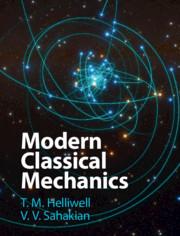The energy of a relativistic free particle is the Hamiltonian H = (sqrt{p^{2} c^{2}+m^{2} c^{4}}) in terms
Question:
The energy of a relativistic free particle is the Hamiltonian H = \(\sqrt{p^{2} c^{2}+m^{2} c^{4}}\) in terms of the particle's momentum and mass.
(a) Using one of Hamilton's equations in one dimension, find the particle's velocity \(v\) in terms of its momentum and mass.
(b) Invert the result to find the momentum \(p\) in terms of the velocity and the mass.
(c) Then find the free-particle Lagrangian for a relativistic particle using the Legendre transform
\[L(v)=p v-H\]
(d) Beginning with the same Hamiltonian, generalize parts (a), (b) and (c) to a relativistic particle free to move in three dimensions.
Fantastic news! We've Found the answer you've been seeking!
Step by Step Answer:
Related Book For 

Question Posted:





